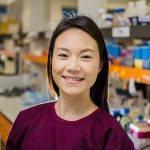Please register online using this link for your unique passcode to join the seminar.
Madeleine (Maddy) Ray completed a Bachelor of animal science with first class honours in 2020 with the School of Agricultural, Environmental and Veterinary Sciences at Charles Sturt University. The project produced a systematic review of the history of parasitology in Australian native water birds, with special interest in duck species. Due to her passion for animal health, Maddy began her PhD, with Charles Sturt University and is currently in her third year. Her research focuses on the parasites of Australian native ducks using both traditional morphological and modern molecular techniques to identify parasite species. Though her research, Maddy is keen to find out how these parasites impact host health along with their potential for zoonosis.
As we are aware parasites are everywhere, however they are severely neglected in Australia, especially when we look at the knowledge of parasites surrounding our native wildlife species particularly our native birds. Waterbirds are of a key interest due to their use of both terrestrial and aquatic environments for survival. By using both types of environments these birds are exposed to a much higher diversity of parasites to say birds that are purely terrestrial. Not only is their use of environment influential but also the behaviours in which they exhibit can also have a great impact on parasites exposure. There is currently a very large gap in knowledge of almost 50 years with many of the traditional repots only being able to identify parasites to the family or genus level. The development of molecular technologies in recent years has resulted in a more in depth understanding of parasites and how they interact with their hosts. Parasites obviously do not only affect animal hosts, but many are zoonotic in nature and result in varying levels of disease in humans. So far, my research has found several parasites that have a potential to be zoonotic along with being of economic significance to the agricultural, particularly the poultry industry.
 Aya is a research fellow in Robin Gasser’s lab at the University of Melbourne. Her PhD at RMIT University focused on a novel method for delivering antigens, using a nanoparticle template to create protein-based nanocapsules for vaccines targeting pathogens like malaria parasites. Prior to her PhD, Aya earned her BSc (Honours) at RMIT, characterising malarial proteins as potential vaccine candidates.
Aya is a research fellow in Robin Gasser’s lab at the University of Melbourne. Her PhD at RMIT University focused on a novel method for delivering antigens, using a nanoparticle template to create protein-based nanocapsules for vaccines targeting pathogens like malaria parasites. Prior to her PhD, Aya earned her BSc (Honours) at RMIT, characterising malarial proteins as potential vaccine candidates.
In her postdoctoral journey, she has taken on diverse roles, from developing a nanocapsule vaccine for Helicobacter pylori at RMIT, advancing food allergy diagnosis and conducting clinical studies at James Cook University to structural characterisation of allergens at synchrotron. She also explored the therapeutic potential of algae-derived compounds for gut inflammatory diseases through an industry collaboration.
Currently, Aya is leading efforts in anthelmintic discovery and development. Her team, through public-private partnerships, has screened over 250,000 compounds in the last four years since the establishment of a new high-throughput screening platform, resulting in the discovery of synthetic and natural-derived “hit” compounds with selective activity against parasitic worms. Her presentation will showcase the phenotypic screening platform using nematode of parasitic (Haemonchus contortus) and free-living (Caenorhabditis elegans), and her success in identifying anthelmintic compounds.
Our ASP Online Seminar Series image is created by Thorey Jonsdottir.









